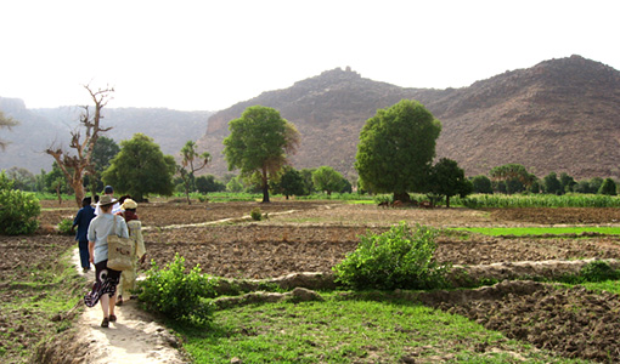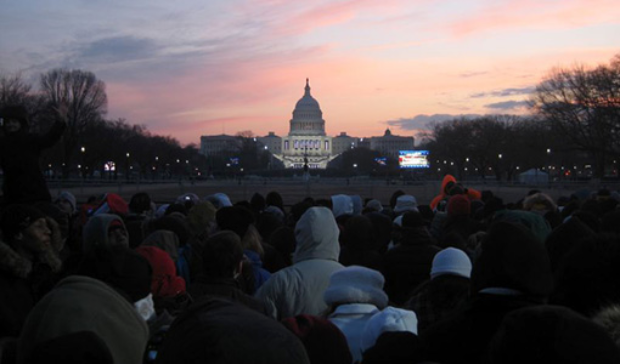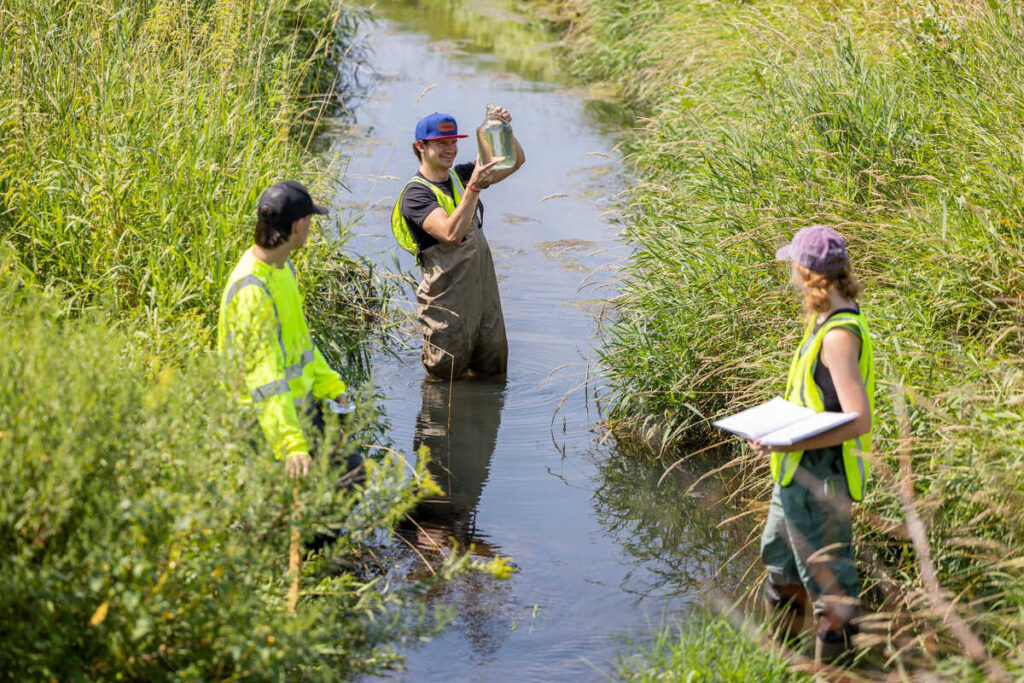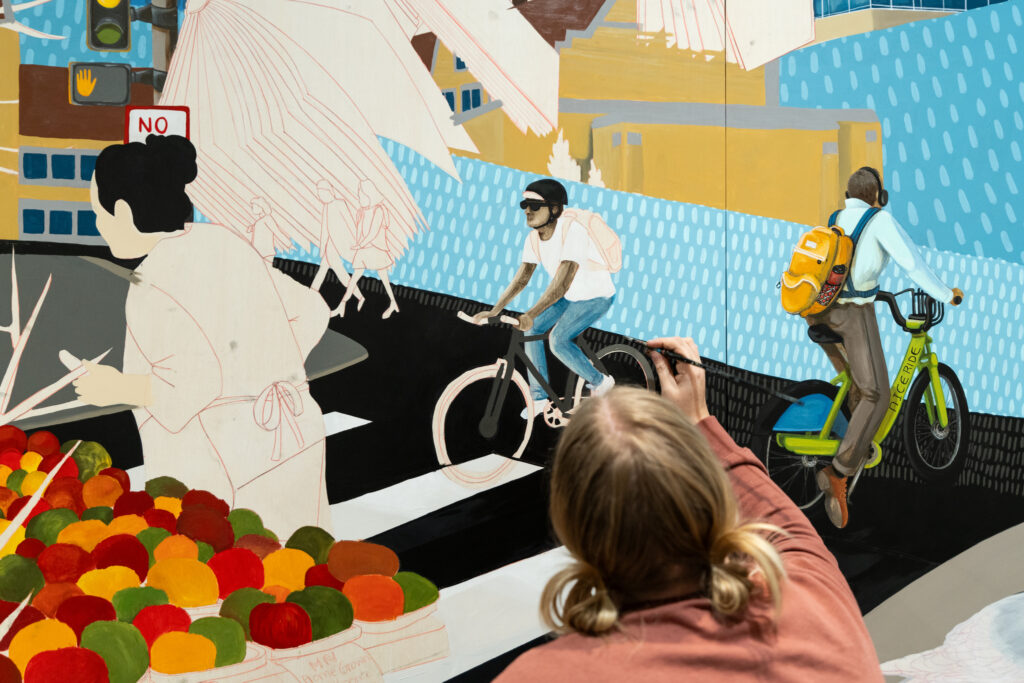BORKO, MALI - In the small village of Borko, Mali, you can spot a visitor from a mile away.
Even when they don’t carry cameras, tourists stand out because of ever-present crowds of children swarming them. The kids, poor and excited to see new faces, usually ask for a water bottle or a pen – something small and easy to give away. And the tourists are happy to oblige.
I experienced this firsthand in January, when I went to Borko as part of a project meant to give residents of this tiny village a new way to move beyond poverty.
The children of Borko were certainly persuasive, but we had been instructed not to give them any of our things; what we were trying to give them required more work and dedication than surrendering a water bottle.
A U.S. Department of Agriculture grant teamed St. Thomas with the Mali Agribusiness Centre. Multiple projects have been funded by the grant, which has brought a number of St. Thomas students and faculty from different disciplines to Mali.
UST students and faculty brought their skills to work on specific projects here, but we receive as much as we give.
The grant made it possible for Mali Agribusiness Centre members to visit St. Thomas and other U.S. colleges to gain the knowledge and skills necessary to fulfill their organization’s mission: to give Malians the tools they need to lift themselves from and stay out of poverty.
Centre member Madame Aissata Thera is working on a seed potato project in Borko.
“Borko is like most of the villages in Mali,” she said. “The people are poor; they have a lot of health and nutrition problems, and organizational problems. So, it’s always good to try and help them get out from that poverty cycle.”
The potato was once a big export for Mali, but a bacterial wilt disease not only wiped out potato plants across most of the country but also scarred the soil and made it unusable for future potato growth.
Most potatoes in Mali are now grown in the far south of the country, and all the seed potatoes are imported from Europe. Prices for these European seed potatoes, which often do not arrive at the correct time of year, are high.
Fortunately, farmers in Borko stopped planting potatoes before the bacterial wilt spread through the country. Its untainted soil also is very rich because of the abundance of water in the area, making it an ideal location to pilot a seed potato project.
The Malian seed potatoes would cost less, be more immune to disease in the soil, and be more certain to arrive at the correct planting time.
As a member of the sociology team, I spent five days in Borko with Thera, Dr. Susan Smith-Cunnien of the UST Sociology and Criminal Justice Department, and two other students. Serving as French translators were Dr. Ashley Shams of the St. Thomas Modern and Classical Languages Department and two of her students. We interviewed village leaders and farmers to gauge the village’s ability to grow the seed potatoes and report the status of the project.
The farmers of Borko grow a variety of crops; they store and eat some of them themselves, but they sell most of them. Garlic is a big cash crop in the village, but selling prices have dropped as the vegetable has become more available.
Still, it makes more economic sense to use money from these sales to buy food throughout the year, rather than to farm only for food.
The main subsistence foods are cereals: rice, millet and sorghum, none of which provide enough necessary nutrients when eaten alone. These crops all grow well, but the village is missing a crop that can be both sold for profit and eaten for its nutritionalvalue.
The centre hopes the seed potato (and in time, the ‘real’ potato) can fill the nutritional and financial needs of the village and provide a better seed potato for the rest of the country.
The seed potatoes are still in an incubator just outside of Bamako, Mali’s capital. The villagers in Borko often asked us why the project was taking so long. It’s easy to understand why they are so impatient: Most villagers are malnourished and extremely poor. It was hard to explain to those who can’t afford food for their children that you can’t help them in a more immediate and direct way.
As my classmates and I discussed this dilemma, we talked about all the projects that have come through Borko in the past. Earlier this year, a truckload of baby food was delivered to provide nutrition to children. It helped, but it didn’t last long.
Material aid definitely has a time and place, but in a place like Borko that has all the right tools to be independent, it seems more like pity.
Still, it is difficult to explain the long-term benefits of our project to people who have such immediate needs.
Souleymane Kassambara, the deputy mayor of Borko, told us the villagers will have a hard time waiting for seed potatoes. “It’s difficult for them, because they are used to having cash back right away. They are not rich and need the money for life expenses,” Kassambara said.
I asked Thera why she is so dedicated to something that can seem so full of empty promises to the people of Borko: “[Their doubt is] normal,” she said. “I think that because I’m educated, I can see things differently … to help them see what I’m seeing. And if you have a good way to convince them, a good way to show them… I think they will [be patient].”
Of course, we didn’t just drive into Borko and start telling people what to do. Doing that would have been disrespectful of their culture and abilities; it would have been cultural imperialism. So, it is important for us to spend sufficient time and effort on this project, to cultivate trusting relationships with both the residents of Borko and our colleagues at the centre.
Keeping up relationships with people 5,000 miles away is never easy, but it is even harder to navigate the cultural differences. The most immediate obstacle is the language barrier. Most of the centre members spoke fluent English but that was not the case in Borko, where no one spoke English and only a handful spoke French. Our interviews involved two layers of translation, from English to French, and then to the native Dogon and back again. The French students gained fantastic experience, but it was a tedious system at best.
To complicate matters, the Malian concept of time is very different from ours. Danielle LeCorps, one of the French students, summed up the difference: “Where we in the United States see time as money, the [Malians] see time as something you have to enjoy. They make every second count for them, but not for everyone else.”
Because our hosts in Borko were so generous in every other way, we knew they weren’t being selfish with their time; it was just the way they do things.
Still, time spent waiting often put us further and further behind with our work. “We had expectations when we came to Borko that we would probably interview two or three times the number of people we actually did,” Smith-Cunnien said.
When you consider the impoverished state of Mali – and this could be true for other areas with similar economic circumstances – the reason that time is treated in such a seemingly casual way becomes obvious.
“It’s the most valuable thing they have,” LeCorps said. “They don’t have a lot of money, they don’t have a lot of basic necessities. … [Time] is the only thing they can hold on to, and the only thing they can say they have, so they try to cherish it as much as possible.”
Once we understood this cultural difference, our work goals didn’t seem as important as they once were. Our method of communication was slow, but it worked. The amount of surveys completed wasn’t as vital as the time we spent getting to know the people around us. We no longer saw the people of Borko as a list of names on one of our surveys but, rather, as people we knew and trusted.
The overall goal of our project was not to give the residents of Borko a truckload of nutritional vegetables to feed their families; it was to share our expertise, skills and ideas.
Although the material things we provided will one day run out, the ideas we shared with them will last much longer. Families can eat for a week on a truckload of potatoes, but to feed their children, and their children’s children, they will need more.
“To me, development is not ‘Give food, give things,’” Thera said. “It is to teach them, to be able to have, to create [for] themselves their own income. They need to learn something with which they could produce, make a profit, get income and take care of themselves.”
About the Author: Nathaniel Minor is a junior majoring in sociology and communication and journalism.







